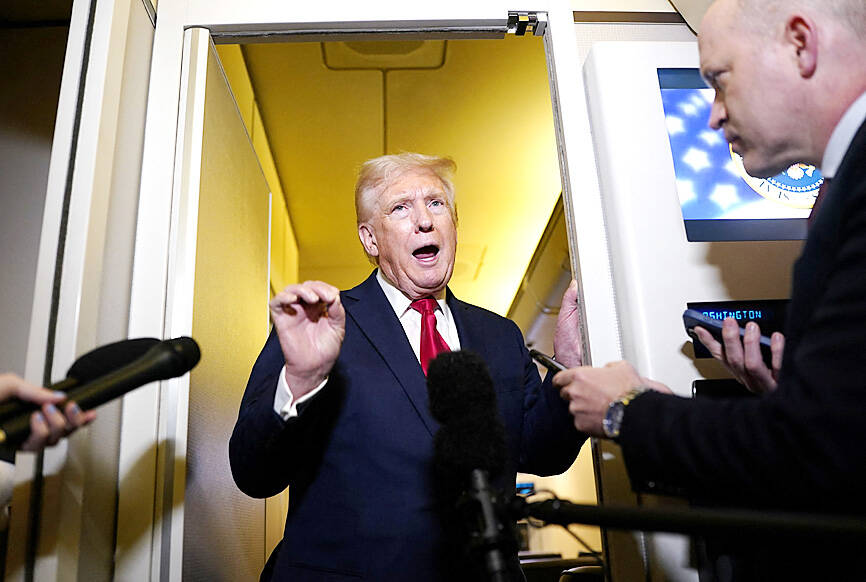Markets yesterday welcomed a US tariffs reprieve for electronics, but US President Donald Trump warned no country would get “off the hook” in his trade war — especially China, while pledging to impose tariffs on semiconductors in the “not distant future.”
While the US on Friday listed tariff exemptions for smartphones, laptops, semiconductors and other electronic products for which China is a major source, Trump and some of his top aides said on Sunday that the exemptions had been misconstrued and would only be temporary as his team pursued fresh tariffs against many items on the list.
“NOBODY is getting ‘off the hook’ ... especially not China which, by far, treats us the worst,” Trump posted on his Truth Social platform.

Photo: Reuters
Chinese President Xi Jinping (習近平) yesterday said that protectionism “will lead nowhere” and a trade war would “produce no winner.”
Shares in Taiwan yesterday closed slightly lower, with initial gains eroded as lingering concerns over the Trump administration’s tariffs on semiconductors continued to hurt market sentiment.
The TAIEX closed down 15.68 points, or 0.08 percent, at 19,513.09, while Taiwan Semiconductor Manufacturing Co (TSMC, 台積電), the most heavily weighted stock on the local market, lost 2.7 percent.
“Investors simply took the money and ran after trimming their holdings in TSMC as the TAIEX rebounded today,” Cathay Futures Consultant Co (國泰證期) analyst Tsai Ming-han (蔡明翰) said. “They fear Trump’s tariffs on semiconductors will bomb the market.”
Other Asian and European stock markets yesterday rallied over the news of Washington’s new exemptions. The Paris, Frankfurt and London stock exchanges were up about 2 percent in morning deals, while Tokyo finished 1.2 percent higher, Seoul gained 1 percent and Hong Kong jumped 2.3 percent.
Shanghai picked up 0.8 percent after the latest data showed that China’s exports last month surged 12.4 percent from a year earlier.
However, the relief could be short-lived, with some of the exempted consumer electronics targeted for upcoming sector-specific tariffs on goods deemed key to US national defense networks.
On Air Force One on Sunday, Trump told reporters that tariffs on semiconductors “will be in place in the not distant future.”
“Like we did with steel, like we did with automobiles, like we did with aluminum ... we’ll be doing that with semiconductors, with chips and numerous other things,” he said.
“We want to make our chips and semiconductors and other things in our country,” Trump reiterated, adding that he would do the same with “drugs and pharmaceuticals.”
The US president said he would announce tariffs rates for semiconductors “over the next week,” while US Secretary of Commerce Howard Lutnick said they would likely be in place “in a month or two.”
The White House insists the aggressive policy is bearing fruit, saying dozens of countries have already opened trade negotiations to secure deals before the 90-day pause ends.
“We’re working around the clock, day and night, sharing paper, receiving offers and giving feedback to these countries,” US Trade Representative Jamieson Greer told CBS’ Face the Nation on Sunday.
Additional reporting by CNA with staff writer

STEEP DECLINE: Yesterday’s drop was the third-steepest in its history, the steepest being Monday’s drop in the wake of the tariff announcement on Wednesday last week Taiwanese stocks continued their heavy sell-off yesterday, as concerns over US tariffs and unwinding of leveraged bets weighed on the market. The benchmark TAIEX plunged 1,068.19 points, or 5.79 percent, to 17,391.76, notching the biggest drop among Asian peers as it hit a 15-month low. The decline came even after the government on late Tuesday authorized the NT$500 billion (US$15.2 billion) National Stabilization Fund (國安基金) to step in to buoy the market amid investors’ worries over tariffs imposed by US President Donald Trump. Yesterday’s decline was the third-steepest in its history, trailing only the declines of 2,065.87 points on Monday and

TAKING STOCK: A Taiwanese cookware firm in Vietnam urged customers to assess inventory or place orders early so shipments can reach the US while tariffs are paused Taiwanese businesses in Vietnam are exploring alternatives after the White House imposed a 46 percent import duty on Vietnamese goods, following US President Donald Trump’s announcement of “reciprocal” tariffs on the US’ trading partners. Lo Shih-liang (羅世良), chairman of Brico Industry Co (裕茂工業), a Taiwanese company that manufactures cast iron cookware and stove components in Vietnam, said that more than 40 percent of his business was tied to the US market, describing the constant US policy shifts as an emotional roller coaster. “I work during the day and stay up all night watching the news. I’ve been following US news until 3am

Six years ago, LVMH’s billionaire CEO Bernard Arnault and US President Donald Trump cut the blue ribbon on a factory in rural Texas that would make designer handbags for Louis Vuitton, one of the world’s best-known luxury brands. However, since the high-profile opening, the factory has faced a host of problems limiting production, 11 former Louis Vuitton employees said. The site has consistently ranked among the worst-performing for Louis Vuitton globally, “significantly” underperforming other facilities, said three former Louis Vuitton workers and a senior industry source, who cited internal rankings shared with staff. The plant’s problems — which have not

TARIFF CONCERNS: The chipmaker cited global uncertainty from US tariffs and a weakening economic outlook, but said its Singapore expansion remains on track Vanguard International Semiconductor Corp (世界先進), a foundry service provider specializing in producing power management and display driver chips, yesterday withdrew its full-year revenue projection of moderate growth for this year, as escalating US tariff tensions raised uncertainty and concern about a potential economic recession. The Hsinchu-based chipmaker in February said revenues this year would grow mildly from last year based on improving supply chain inventory levels and market demand. At the time, it also anticipated gradual quarter revenue growth. However, the US’ sweeping tariff policy has upended the industry’s supply chains and weakened economic prospects for the world economy, it said. “Now